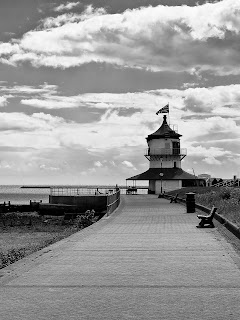From our early childhood we carry memories of unspoilt beaches offering idyllic settings:
but even then we were beginning to take for granted as a natural part of the scene man's attempts to control the sea and prevent it washing away the things we wanted to visit.
Here we see breakwaters designed to prevent the erosion of the beach that have become so much part of the 'seaside' that they are almost invisible to us as we sit on the downwind side and claim our space. Recent attempts to prevent the sand being washed away are more brutal in appearance:
and offensive to the eye and yet these too may well become accepted as normal as time passes and we begin to feel that they have always been there.
The coastline is a dangerous place particularly for shipping and man has long relied upon the lighthouse to give the mariner an indication of where he is and where danger lurks from early wooden buildings such as the Low Lighthouse at Harwich
to the very modern. Built at Dungeness to replace a much older building that is now a tourist attraction it is one in a very long line of such structures on this sight.
Being an island race we have long had to defend our shores. Some defences dominate the shoreline but because of their age and familiarity and their use of local materials they are seen as a 'natural' part of the area in which they stand such as at Bambergh Castle in Northumberland.
In later times the fear of invasion by Napoleon's forces led to the construction of defensive towers along our eastern and southern coastlines.
Here the two Martello towers seen on the horizon are reminders of more fearful times. Again time and familiarity have lled to their acceptance and in some cases conversion to other uses.
Of course the coast has offered man many benefits not least in the carrying out of trade with other Countries. Modern containerisation has led to investment in container ports with their massive cranes dominating the skyline for miles around. Harwich harbour remains very much a traditional port yet just a short distance up the coast is Britain's largest container port - Felixstowe.
Shot from Harwich we see the clutter and debris so much part of man's presence. Often we forget that much that is unsightly along our coast is caused by the thoughtlessness of people who care little for the disfigurement caused by their neglect. In the distance the disfiguring of the skyline by the giant cranes of the Container port at Felixstowe.
Even so for many of us the seaside is a day out for pleasure and indulgence. Unfortunately there is a price to pay and what is one man's pleasure beach is another man's nightmare. Skegness Pleasure Beach represents the many similar features up and down our Coast. I wonder what the planning authorities would say now if proposals were made for a similar invasion.
This image of Great Yarmouth at sunset shows yet another impact of man - light pollution. We are so used to it in all our towns and cities that we no longer see it as being a nuisance or possibly not see it all.
Perhaps the most disturbing feature of the use of our coastline is the building of nuclear power stations. Justified on the grounds of less risk to the population at large as Chernobyl and recent events in Japan has shown a major catastrophe puts millions at risk across a vast tract of our planet wherever the Plant is located.
Here at Dungeness in Kent the power station stands in juxtaposition to the old lighthouse. The are two nuclear power stations here; one of which is now being decommissioned whilst the other has an expected life until 2016. The necessary transmission lines are visible for miles.
We take for granted much of what is around us and, probably for most without thinking the gradual erosion by man's activities of the Coast that has been a source of enjoyment and relaxation for the last two centuries. Man has long earned his living from the bounty of the ocean but now there is heavy reliance on the tourist trade that brings not only cash to the economy but also the hidden price of over-use of the resources. One has only to pay a short visit to most of our Coast to realise that we are rapidly losing that which we hold most dear.












No comments:
Post a Comment